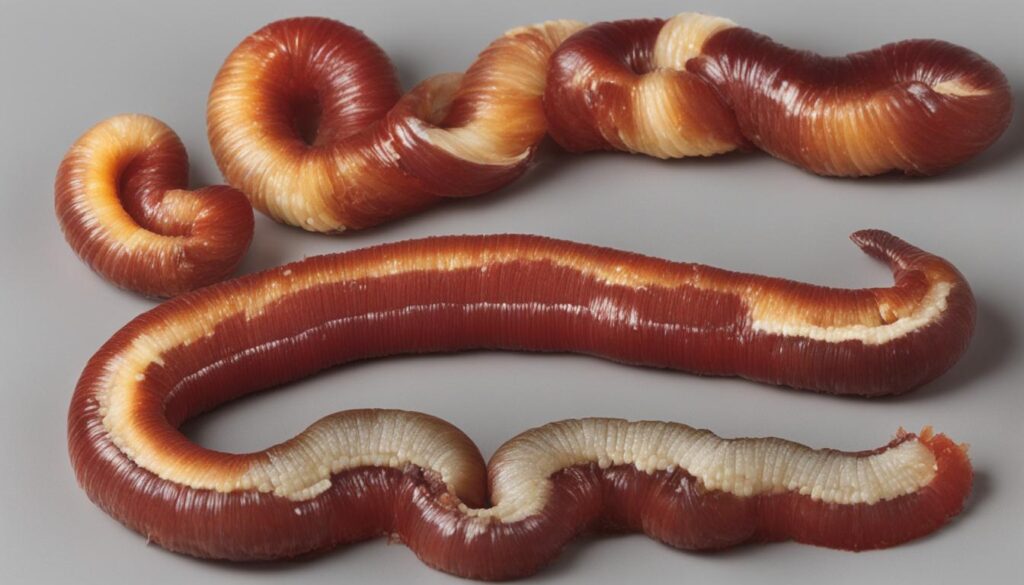Worms Emerging from Dogs at Night: Fact Check
Dogs can be affected by various types of worms, including roundworms, hookworms, whipworms, tapeworms, and more. It is a common concern among dog owners whether these worms crawl out of their dogs at night. Let’s examine the facts and shed light on this issue.
Key Takeaways:
- Worms do not actively crawl out of dogs at night, contrary to popular belief.
- Dogs can be infested with different types of intestinal worms, each with its own lifecycle and mode of transmission.
- Common symptoms of worm infestations in dogs include diarrhea, vomiting, and weight loss.
- Prevention and treatment of worm infestations involve regular deworming and proper hygiene practices.
- Maintaining good hygiene and seeking regular veterinary care are essential for dog health maintenance.
Types of Intestinal Worms in Dogs
Dogs can be infected with different types of intestinal worms that can have varying effects on their health. Some common types of intestinal worms found in dogs include:
1. Roundworms
Roundworms, also known as ascarids, are one of the most common types of intestinal worms that affect dogs. They are white or tan in color and resemble spaghetti when passed in the dog’s feces. Roundworms are typically contracted through ingestion of the worm’s eggs, which can be found in soil contaminated with feces from infected dogs. Puppies can also become infected from their mother’s milk.
2. Hookworms
Hookworms are small, thin worms that attach to the lining of the dog’s intestines and feed on its blood. They can cause anemia, weight loss, and in severe cases, even death. Hookworms are typically contracted by walking on soil contaminated with the worm’s larvae or through ingestion of larvae from grooming. Puppies can also become infected through their mother’s milk or while in the womb.
3. Whipworms
Whipworms are small worms with a whip-like tail that reside in the dog’s large intestine. They can cause chronic diarrhea, weight loss, and anemia. Whipworms are generally contracted by ingesting whipworm eggs from contaminated soil or by grooming and licking their fur after coming into contact with feces from infected dogs.
4. Tapeworms
Tapeworms are long, segmented worms that attach to the dog’s intestines. They are flat and usually appear in the dog’s feces or around its anus. Tapeworms can be contracted by ingesting fleas that have ingested tapeworm eggs, as well as by ingesting infected rodents or other animals. Dogs can also acquire tapeworms by ingesting contaminated soil or grass.
Different types of intestinal worms in dogs may exhibit different symptoms and require specific treatments. It is important for dog owners to consult a veterinarian for accurate diagnosis, treatment, and prevention strategies.
| Types of Intestinal Worms | Appearance | Transmission | Common Symptoms |
|---|---|---|---|
| Roundworms (Ascarids) | White or tan, spaghetti-like | Ingestion of eggs from contaminated soil or infected mother | Pot-bellied appearance, vomiting, diarrhea, poor growth |
| Hookworms | Small, thin worms | Penetrating the skin or ingestion of larvae from contaminated soil or infected mother | Anemia, weight loss, dark or bloody stools |
| Whipworms | Small worms with a whip-like tail | Ingestion of eggs from contaminated soil or grooming after contact with feces | Chronic diarrhea, weight loss, anemia |
| Tapeworms | Long, segmented worms | Ingestion of fleas or infected rodents/animals, contaminated soil | Rice-like segments in feces or around anus, irritation, anal itching |
Worm Lifecycle and Mode of Transmission
The lifecycle of intestinal worms involves the ingestion of worm eggs or larvae by the dog, followed by the development and maturation of the worms in the dog’s gastrointestinal tract. Understanding the lifecycle of these worms is crucial in preventing and controlling infestations.
The mode of transmission of intestinal worms can vary depending on the type of worm. Here are some examples:
- Roundworms and Hookworms: These worms can be transmitted to dogs through infected soil or contaminated feces. Dogs can ingest the worm eggs or larvae while sniffing or licking contaminated surfaces. The worms then develop and mature in the dog’s gastrointestinal tract.
- Tapeworms: Dogs can contract tapeworms by ingesting fleas or infected prey animals such as rodents. Once ingested, the tapeworms attach to the dog’s intestinal lining and start producing segments that contain eggs.
Preventing the transmission of dog worms requires proper sanitation practices. Dog owners should regularly clean up their pet’s feces, especially in outdoor areas, to minimize the risk of contamination. Additionally, maintaining a clean living environment and practicing good hygiene, such as washing hands after handling dogs or soil, can further reduce the chances of worm transmission.
Comparison of Worm Lifecycle and Mode of Transmission
| Worm Type | Lifecycle | Mode of Transmission |
|---|---|---|
| Roundworms | Eggs or larvae are ingested by dogs. The worms develop and mature in the gastrointestinal tract. | Infected soil or contaminated feces. |
| Hookworms | Eggs or larvae penetrate the dog’s skin or are ingested. The worms develop and mature in the gastrointestinal tract. | Infected soil or contaminated feces. |
| Tapeworms | Eggs or larvae are ingested by dogs. The worms attach to the intestinal lining and produce segments containing eggs. | Ingesting fleas or infected prey animals. |

Symptoms and Health Effects of Worm Infestations
Worm infestations in dogs can have various symptoms and health effects. It is important for dog owners to be aware of these signs and seek veterinary care when necessary. Common symptoms of worm infestations in dogs include:
- Diarrhea: Dogs with worm infestations may experience frequent loose stools.
- Vomiting: Worms can cause nausea and induce vomiting in dogs.
- Weight loss: Worm infestations can lead to a noticeable decrease in a dog’s body weight.
- Poor coat condition: Infested dogs may have dull, dry, or matted fur.
- Pot-bellied appearance: Some worms, like roundworms, can cause the dog’s abdomen to appear swollen or bloated.
In severe cases, dog worm infestations can have more serious health consequences. These may include:
- Anemia: Worms feeding on the dog’s blood can lead to anemia, causing weakness and pale gums.
- Dehydration: Persistent diarrhea or vomiting can result in dehydration if left untreated.
- Intestinal blockage: In rare cases, a heavy worm burden can cause an obstruction in the dog’s intestines, leading to severe abdominal pain and discomfort.
If you notice any of these symptoms or suspect your dog may have worms, consult a veterinarian for a proper diagnosis and appropriate treatment.
Brief Passage on Seeking Veterinary Care
It is essential to prioritize your dog’s health and well-being. Seeking veterinary care is crucial when dealing with worm infestations. A professional diagnosis will not only confirm the presence of worms but also determine the specific type of worms affecting your dog. This information is vital in designing an effective treatment plan. Worm infestations can be detrimental to your dog’s health if left untreated, so prompt veterinary attention is highly recommended.
| Common Symptoms of Dog Worm Infestations | Health Consequences of Dog Worm Infestations |
|---|---|
| Diarrhea | Anemia |
| Vomiting | Dehydration |
| Weight loss | Intestinal blockage |
| Poor coat condition | |
| Pot-bellied appearance |
Quote: Importance of Veterinary Care for Dog Worm Infestations
“The health effects of dog worm infestations can vary depending on the severity and type of worms. Seeking veterinary care ensures that your dog receives the necessary treatment to eliminate the worms and prevent potential complications. Regular check-ups and deworming protocols recommended by your veterinarian play a crucial role in keeping your dog healthy and worm-free.” – Dr. Emily Johnson, DVM
By being aware of the symptoms and health effects of dog worm infestations, you can take proactive measures to protect your furry friend’s well-being. Regular veterinary care and timely treatment can effectively address worm infestations and support your dog’s overall health.

Prevention and Treatment of Worm Infestations
Ensuring the prevention and treatment of worm infestations is essential for maintaining the health and well-being of dogs. By following regular deworming protocols recommended by veterinarians, dog owners can effectively prevent infestations and control the spread of worms.
There are various options available for deworming dogs, including medications and products that specifically target different types of worms. Some commonly used medications for deworming dogs include milbemycin oxime, praziquantel, spinosad, and imidacloprid.
Deworming medications can be administered orally or topically, depending on the specific product. It is important for dog owners to carefully follow the recommended dosages and treatment schedules provided by their veterinarians to ensure the effective elimination of worms from their dog’s system.
Benefits of Preventative Measures:
- Preventive actions: Regular deworming helps to prevent worm infestations in dogs, reducing the risk of associated health issues.
- Elimination of worms: Deworming medications effectively eliminate existing worms from the dog’s system, promoting better overall health.
- Reduced transmission: By preventing infestations and eliminating worms, dog owners can help reduce the risk of worm transmission to other animals and humans.
Effective Preventative Measures:
- Deworming: Follow the recommended deworming protocols provided by your veterinarian to prevent infestations and treat existing worm burdens.
- Hygiene Practices: Maintain good hygiene practices, including prompt cleanup of feces, proper disposal, and regular handwashing to minimize the risk of worm transmission.
- Veterinary Care: Schedule regular veterinary check-ups for your dog to ensure comprehensive health care and discuss deworming options.
By prioritizing preventative measures and following proper treatment protocols, dog owners can effectively protect their pets from worm infestations and ensure their overall well-being.
Can Worms Crawl Out of Dogs at Night?
While there is a common belief that worms crawl out of dogs at night, this is actually misleading. Worms typically reside in the dog’s gastrointestinal tract and do not actively crawl out during the night. However, it is important to understand that dogs with severe infestations or a heavy burden of worms may shed more worm segments or eggs in their feces. These shed segments or eggs can be visible during both the day and night.
Regular deworming of dogs is essential to prevent excessive worm shedding and to reduce the risk of transmission to other animals and humans. Additionally, maintaining proper hygiene practices can further minimize the spread of worms. This includes promptly cleaning up after your dog, properly disposing of feces, and practicing good hand hygiene.
It is important to note that worms do not actively crawl out of dogs at night. Regular deworming and proper hygiene practices can help prevent excessive worm shedding and reduce the risk of transmission.
By taking these preventive measures, dog owners can ensure the health and well-being of their pets and contribute to a cleaner and safer environment for everyone.
The Importance of Hygiene and Regular Veterinary Care
Maintaining good hygiene practices and providing regular veterinary care are vital for the overall health of dogs. By following proper hygiene practices, dog owners can minimize the risk of worm transmission and ensure the well-being of their furry companions.
First and foremost, dog owners should clean up after their pets promptly. Properly disposing of feces helps prevent the contamination of soil and water sources with worm eggs and larvae. This simple act of responsibility not only contributes to a cleaner environment but also reduces the likelihood of worm infestations in dogs.
Additionally, practicing proper hand hygiene after handling dogs or cleaning up after them is crucial. Washing hands thoroughly with soap and water helps eliminate any potential transfer of worm eggs or other pathogens to humans.
Regular veterinary check-ups play a significant role in dog health maintenance. During these visits, veterinarians can assess the overall health of dogs, including monitoring for signs of worm infestations. They may recommend fecal examinations to detect the presence of worms and prescribe appropriate deworming treatments if necessary.
Following deworming protocols recommended by the veterinarian is essential for preventing and treating worm infestations effectively. These protocols may involve regular administration of deworming medications tailored to the specific needs of the dog. By adhering to these protocols, dog owners can help eliminate worms from their pets’ systems and reduce the potential health risks associated with infestations.
Key Takeaways:
- Clean up after your dog promptly to minimize the risk of worm transmission.
- Practice proper hand hygiene to prevent the transfer of worm eggs or other pathogens to humans.
- Schedule regular veterinary check-ups to monitor your dog’s health and detect potential worm infestations.
- Follow deworming protocols recommended by your veterinarian to effectively prevent and treat worm infestations.
By prioritizing hygiene practices and regular veterinary care, dog owners can help maintain the health and well-being of their canine companions, safeguarding them against the potential risks of worm infestations.
Conclusion
Dog worm infestations are a common concern among dog owners, but it is important to dispel the misconception that worms crawl out of dogs at night. Worms typically reside in the dog’s gastrointestinal tract and do not actively crawl out. Understanding the types of worms, their lifecycle, and the importance of prevention and treatment is crucial for responsible dog ownership.
By following proper hygiene practices, such as promptly cleaning up after your dog and disposing of feces properly, you can minimize the risk of worm transmission. Additionally, regular veterinary check-ups and adhering to deworming protocols recommended by your veterinarian can help prevent and treat worm infestations effectively.
Remember, keeping your dog’s health in check and reducing the risk of worm infestations involves being proactive and well-informed. By taking the necessary precautions, you can help keep your beloved pet healthy and happy for years to come.
FAQ
Do worms crawl out of dogs at night?
No, worms do not actively crawl out of dogs at night. They typically reside in the dog’s gastrointestinal tract.
Can worms emerge from dogs during the night?
While worms do not crawl out of dogs at night, dogs with severe infestations may shed more worm segments or eggs in their feces, which can be visible during the day or night.
What types of intestinal worms can dogs get?
Dogs can be affected by roundworms, hookworms, whipworms, tapeworms, and other types of intestinal worms.
How do worms get transmitted to dogs?
Worms can be transmitted to dogs through infected soil or contaminated feces, ingestion of fleas or infected prey animals, or other means depending on the type of worm.
What are the symptoms and health effects of worm infestations in dogs?
Common symptoms include diarrhea, vomiting, weight loss, poor coat condition, and a pot-bellied appearance. In severe cases, anemia, dehydration, and intestinal blockage can occur.
How can I prevent and treat worm infestations in my dog?
Regular deworming protocols recommended by veterinarians, using medications such as milbemycin oxime, praziquantel, spinosad, and imidacloprid, can help prevent and treat worm infestations in dogs.
Can proper hygiene practices help prevent worm infestations in dogs?
Yes, maintaining good hygiene practices such as promptly cleaning up after your dog, disposing of feces properly, and practicing proper hand hygiene can minimize the risk of worm transmission.
How important is regular veterinary care for preventing and treating worm infestations?
Regular veterinary check-ups and following deworming protocols recommended by your veterinarian are essential for preventing and treating worm infestations effectively.
What is the summary of the facts about dog worm infestations?
Understanding the types of worms, their lifecycle, and the importance of prevention and treatment is crucial for responsible dog ownership. Worms do not crawl out of dogs at night, but proper hygiene and regular veterinary care can help keep your dog healthy and minimize infestation risks.


